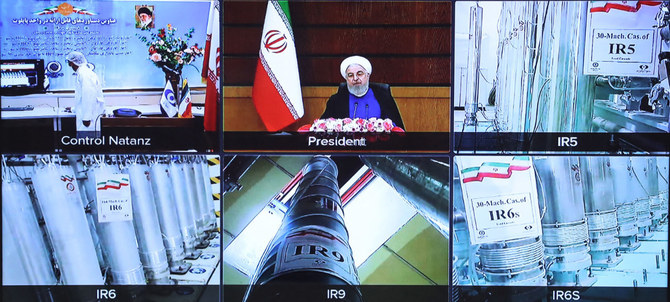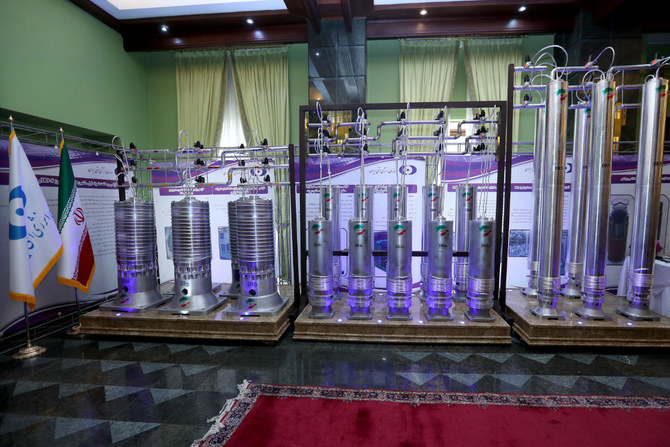TEHRAN/JEDDAH: Iran on Saturday started up advanced uranium enrichment centrifuges in breach of its commitments under the Joint Comprehensive Plan of Action (JCPOA) to curb its nuclear program.
The new move is a direct challenge to the US, after talks began last week aimed at reviving the 2015 nuclear deal. Washington said it had offered “very serious” ideas on rescuing the agreement, which collapsed in 2018 when the US withdrew, but was waiting for Tehran to reciprocate.
Tehran’s response came on Saturday, when President Hassan Rouhani inaugurated a cascade of 164 IR-6 centrifuges for producing enriched uranium, as well as two test cascades of 30 IR-5 and 30 IR-6S devices at the Natanz uranium enrichment plant, in a ceremony broadcast by state television.
Rouhani also launched tests on the “mechanical stability” of its latest-generation IR-9 centrifuges, and remotely opened a centrifuge assembly factory to replace a plant that was badly damaged in a July 2020 explosion widely attributed to Israel.
Rouhani again underlined at the ceremony, which coincided with Iran’s National Nuclear Technology Day, that Tehran’s nuclear program is solely for “peaceful” purposes.
Under the 2015 deal between Tehran and world powers, Iran is permitted to use only “first-generation” IR-1 centrifuges for production, and to test a limited number of IR-4 and IR-5 devices.
When the US withdrew from the nuclear deal in 2018, Donald Trump reimposed crippling sanctions on Tehran, which responded by stepping up its nuclear enrichment to levels prohibited under the JCPOA.
Iran’s latest move follows an opening round of talks in Vienna Tuesday with representatives of the remaining parties to the deal on bringing the US back into it.
All sides said the talks, in which Washington is not participating directly but is relying on the EU as an intermediary, got off to a good start.
However, US allies in the Gulf, including Saudi Arabia, believe any revived deal should also cover Iran’s ballistic missile program and its regional meddling through proxy militias in Yemen, Iraq and elsewhere.
Iran has demanded that the US lift all sanctions imposed by Trump before it resumes compliance with the JCPOA. The US insists that Iran must act first.
“The United States team put forward a very serious idea and demonstrated a seriousness of purpose on coming back into compliance if Iran comes back into compliance,” a US official said.
But the official said the US was waiting for its efforts to be reciprocated by Iran.
Iran is also demanding an end to all US restrictions, but the JCPOA covers only nuclear sanctions and not US measures taken in response to human rights and terrorism issues.
(With AFP)































